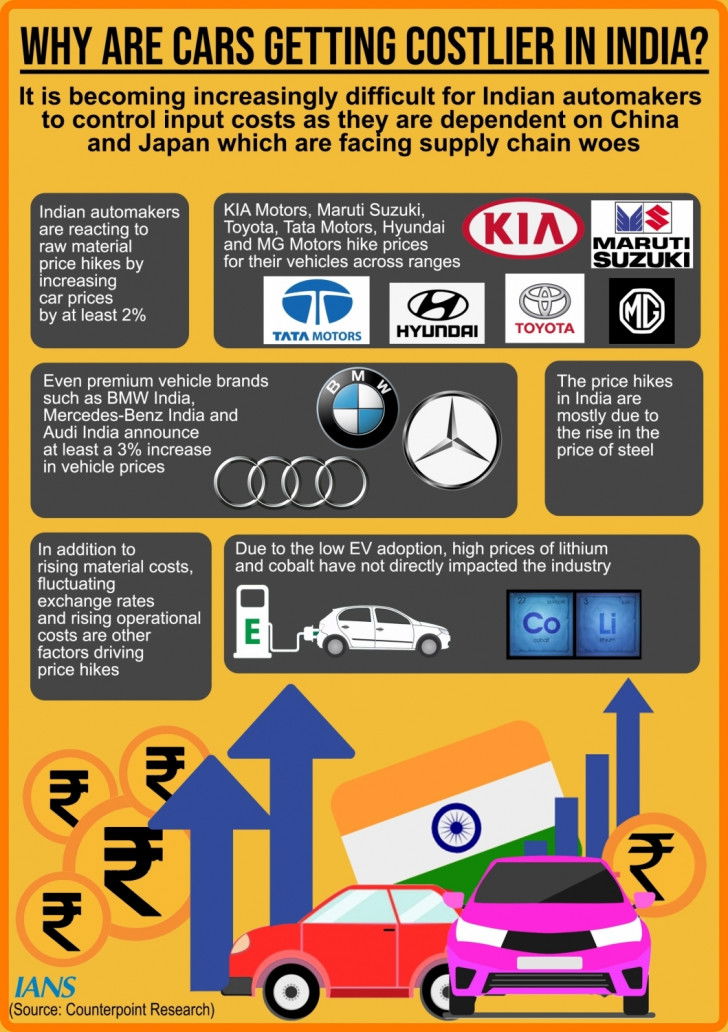Business
Indian automakers face heat amid global constraints, hike prices

New Delhi, April 17
It is becoming increasingly difficult for Indian automakers to control input costs as they are dependent on China and Japan which are facing supply chain woes, resulting in price hikes across vehicle ranges, according to a new report.
Indian automakers are responding to raw material price hikes by at least 2 per cent price hike on average, according to Counterpoint Research.
KIA Motors has increased prices of all its vehicles. Maruti Suzuki, India's largest passenger vehicle (PV) maker, has also increased the average price of its cars by 8.8 per cent since January.
"Toyota, Tata Motors, Hyundai and MG Motors have also increased prices for their vehicles across ranges. Even premium vehicle brands such as BMW India, Mercedes-Benz India and Audi India have announced at least a 3 per cent increase in their vehicle prices," said Soumen Mandal, senior research analyst.
Due to the low electric vehicle (EV) adoption, high prices of lithium and cobalt have not directly impacted the industry in India.
"The price hikes in India are mostly due to the rise in the price of steel. Steel is used in manufacturing vehicle chassis and body. Nickel-containing stainless steel is used in some drivetrain components," Mandal added.
In addition to rising materials costs, fluctuating exchange rates and rising operational costs are other factors driving price increases in the country.
With the semiconductor shortage beginning to ease, 2022 was expected to be a better year, as indicated by increased sales during the initial months.
But Russia's invasion of Ukraine and fresh Covid waves in China have further delayed the industry's recovery.
"Restricted supplies of critical raw materials procured from Ukraine and Russia are causing new supply chain impacts, driving up raw material prices including that of lithium, cobalt and nickel -- the latter by 60 per cent -- as well as aluminium and, to some extent, steel," Mandal explained.
The recent cost increases have already affected the EV industry.
2021 saw EV sales rising by more than 200 per cent but price increases are likely to put the brakes on a continuation of this fast growth.
"For 2022, we expect global passenger vehicle sales will be around 72 million, some 5 million units lower than our earlier projections," said the report.

8 hours ago
Trump softens stance on H-1B visa reform, says US needs to "bring this talent" as it can't rely on long-term unemployed

8 hours ago
India and Vietnam discuss ways to enhance defence, shipbuilding cooperation

8 hours ago
EAM Jaishankar holds talks with US Secretary of State Rubio in Canada

15 hours ago
TN CM Stalin congratulates Art director Thota Tharani for Chevalier Award

15 hours ago
Farah Khan takes a dig at friend Juhi Chawla on her birthday

15 hours ago
Krystle D’Souza opens up on her character’s growth in ‘First Copy 2’

15 hours ago
Florence Pugh suffered 6 months of depression after ‘Midsommar’

15 hours ago
Shilpa Shetty relives her ‘Baazigar’ memories with Shah Rukh Khan as film completes 32 years

15 hours ago
Sayani Gupta reveals why rat was her spirit animal in ‘Delhi Crime 3’

15 hours ago
Trailer of Allari Naresh’s horror-thriller ‘12A Railway Colony’ packs a punch!

15 hours ago
Dharmendra has gone home fully satisfied and is in a stable condition, reveals doctor from Breach Candy Hospital

15 hours ago
Parakamani theft case: SIT continues questioning ex-Andhra Police officers

15 hours ago
Bihar gears up for counting on Nov 14; three-tier security in place at 46 centres






















